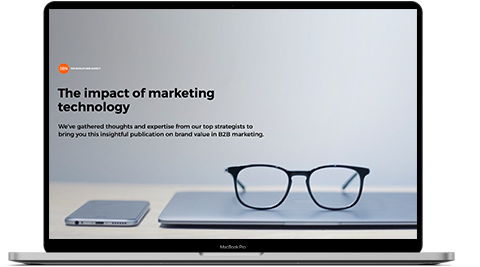Welcome to the second instalment, focusing on smart investment strategies for fearless marketers aiming to win market share in the B2B landscape. In this series, we’ll explore and expand on various facets of B2B marketing. We started with the crucial shift from transactional to transformational B2B customer relationships. In this article, we provide a comprehensive overview of the technologies essential for modern marketing, their practical applications, and their strategic advantages, aiming to guide marketers in navigating the complex digital landscape effectively.
Beyond the CRM: Expanding the Marketer’s Tech Horizon
In the digital age, the marketing landscape is ever-evolving, with customer expectations rising and technologies advancing at an unprecedented pace. While Customer Relationship Management (CRM) systems have revolutionised how businesses interact with customers, they are no longer sufficient on their own. Today’s marketers must look beyond CRM to stay competitive, leveraging a suite of advanced technologies that enhance and extend the capabilities of their CRM systems. This is our take on the essential tools and technologies critical for marketers to succeed in the digital era.
1. Creating a Holistic Digital Presence
The foundation of a successful digital strategy begins with a robust online presence. This requires more than just a website; it necessitates a holistic approach that integrates Content Management Systems (CMS) for seamless content creation and management, along with Search Engine Optimization (SEO) strategies to ensure visibility. A CMS like WordPress or Drupal not only enables marketers to publish content efficiently but also to optimize it for search engines, thereby improving organic search rankings. SEO tools such as SEMrush or Moz offer insights into keywords, competitor analysis, and performance tracking, ensuring a business remains visible to its target audience.
2. Enhancing Customer Experience (CX)
The customer experience (CX) has become the cornerstone of effective marketing. Tools such as Customer Experience Platforms (CXPs) and Customer Data Platforms (CDPs) empower businesses to deliver personalized experiences across customer touchpoints. By integrating data from various sources, these platforms provide a 360-degree view of the customer, enabling targeted communications and personalized content delivery. For instance, Adobe Experience Cloud offers a suite of tools for content, marketing, advertising, and analytics, all designed to improve CX.
3. Leveraging Data-Driven Insights
In today’s data-centric world, the ability to analyze and act on data sets successful businesses apart. Advanced analytics tools and Business Intelligence (BI) platforms like Google Analytics, Tableau, or Power BI enable marketers to derive actionable insights from complex datasets. These insights can inform strategy, product development, and customer engagement tactics, allowing for a more agile and responsive marketing approach.
4. Embracing Multichannel Engagement
The customer journey is no longer linear but a complex web of touchpoints across various channels. Omnichannel marketing tools and marketing automation platforms such as HubSpot or Salesforce Pardot ensure consistent and cohesive communication across all channels. Whether it’s social media, email, web, or SMS, these tools help deliver a unified message, enhancing brand recall and improving customer loyalty.
5. Advancing Personalization with AI and Machine Learning
Artificial Intelligence (AI) and Machine Learning (ML) redefine personalization. AI can predict customer needs and preferences by analysing customer data and behaviours, enabling real-time personalization of content and offers. Tools like Persado or Marketo use AI to optimize marketing messages, while chatbots and virtual assistants provide personalized customer service interactions.
6. Ensuring Security and Privacy
As digital marketing efforts become more sophisticated, so do the threats to customer data security. Implementing robust security measures and privacy technologies is paramount. Solutions like Secure Access Service Edge (SASE) and privacy management software help safeguard data and ensure compliance with regulations such as GDPR and CCPA, building customer trust.
7. Scaling and Adapting with Ease
Scalability and adaptability are crucial for growth. Cloud computing services, like AWS or Google Cloud, offer scalable infrastructure for marketing technologies, ensuring that businesses can adapt to changes in demand without significant upfront investment. Additionally, adopting agile marketing methodologies allows teams to be more flexible and responsive to market changes.
8. Fostering Collaboration and Efficiency
Collaborative tools like Slack, Asana, Bitrix24 or Microsoft Teams streamline communication and project management, enabling marketing teams to work more efficiently and cohesively. Integrating these tools with CRMs and other marketing technologies fosters a culture of collaboration and continuous improvement.
PREMIUM CONTENT
The Courageous Marketer: A guide for the fearless
DOWNLOAD E-BOOK
Incorporating Emerging Technologies
Staying ahead in the digital marketing space also means keeping an eye on emerging technologies. Innovations such as voice search optimization, augmented reality (AR), virtual reality (VR), blockchain for marketing, the Internet of Things (IoT), 5G technology, interactive content, privacy technology, and sustainability tech are reshaping the marketing landscape. By also embracing these technologies, marketers can create more engaging, interactive, and meaningful customer experiences.
Conclusion
Integrating advanced technologies alongside CRM systems is not just a trend but a necessity for modern marketing strategies. By building a tech stack that includes CRM, CMS, SEO, CXPs, CDPs, analytics, AI, and security tools, businesses can enhance their digital presence, improve customer experiences, and drive growth. As the digital ecosystem continues to expand, the ability to adapt and innovate will determine the success of marketing efforts. Expanding the marketer’s tech horizon in this dynamic environment is crucial for staying relevant and achieving long-term success.








